Text
Why learn a foreign language, you ask?
Understanding and speaking the language will at some point inevitably make you feel like a spy/important person... - Bonus points for when you can eavesdrop on public conversations.
Have those fun little moments when you catch mistakes in your target language on signs, merchandise and in media. (Especially if it’s Japanese or Chinese... People love to butcher those).
Imagine what your crush would think if they suddenly realize you speak a different language 3 months after meeting you. They may gasp, exclaim that you’re full of surprises, and go weak in the knees from your oh-so-mysterious demeanor (bonus points if it’s French or Italian).
Fulfill your study aesthetic dreams, because you finally have something to theme a new blog around. Time to splurge on a pretty notebook and nice pens and work on that handwriting. Get the desk set up nice and cute, grab yourself the most beautiful coffee mug you can find. You’ve just become that girl. And you love it. Can’t forget to mention the messy buns, glasses (don’t have to be prescription), cat ownership and plants.
Increase your chances of escaping eternal loneliness TEN FOLD because learning a language just opened doors to millions of people who couldn’t speak yours.
Your personality may shift depending on which language you’re speaking, due to cultural and linguistic differences. So, by learning a new language, you will not only become more knowledgable about the world around you, but about yourself and people in general.
Accurately understand books, shows, and all sorts of media in your target language. (No more relying on suspicious subtitles).
Feel satisfied in knowing that you’ve picked up quite a fun and rewarding hobby that can and will expand your life in every possible way.
#learn japanese#learn french#learn italian#learn turkish#langblr#studyblr#language blog#learn a language
434 notes
·
View notes
Text
時(とき)- When, at the time of
Verb + とき
[い]Adjective + とき
[な]Adjective + な + とき
Noun + の + とき
出かけるときは、「行ってきます」と言います。
When you go out, you say "いってきます"!
私はカラオケに行くときに楽しめます。
When I go to karaoke, I can have fun.
Can you create a sentence using this grammar?

#Japanese#Japanese grammar#Learn Japanese#Beginner Japanese#Intermediate Japanese#Study Japanese#JLPT Grammar#JLPT#N5 Grammar#N4 Grammar#N5#N4#nihongo
38 notes
·
View notes
Text
いつのまにか
(何時の間にか) - before one knows, before one becomes aware of, unnoticed, unaware
いつの間にか夜になりました。It became night before I knew it.
いつの間にか冬休みが終わってしまった。Winter vacation unfortunately ended before I knew it.
来月子供の結婚式があると聞き、いつの間にか小さかった赤ん坊が一人前の大人になったのだと実感しました。When I heard that my child will be married next month, I realized that before I knew it, my once small baby had become a full-fledged adult.

47 notes
·
View notes
Text
N4 Vocab - あさら
あさら (彼方, あっち, あち) that way, over there
あちらの方を見る。I will look over there.
あちらは誰ですか?Who's that over there?
あちらに見えるのが日本で一番高い山、富士山です。That thing visible over there is the tallest mountain in Japan. Mt. Fuji.

#Learn Japanese#Japanese numbers#Japanese#Easy Japanese#Beginner Japanese#Japanese langblr#Japanese language#nihongo#Japanese grammar#Japanese N4 grammar#N4 grammar#intermediate japanese#beginner japanese#review japanese#review japanese grammar#langblr#studyblr#japanese langblr#japanese studyblr#study japanese#learn japanese#bunpro#peistudies
42 notes
·
View notes
Text
Commissions are open! <3
Hi guys! Just letting you in on some exciting news. I decided to lend myself a shot at opening commissions for Japanese info charts and guides!
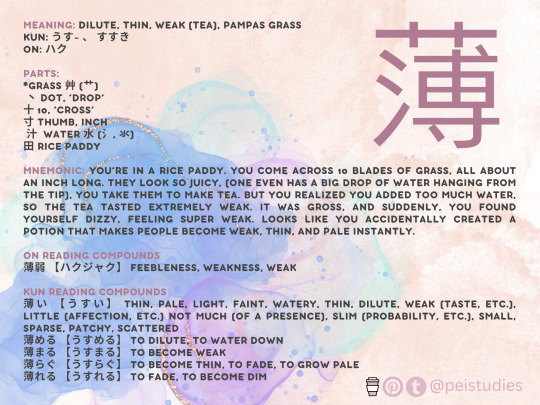

I know it is a bit different from the usual commission style, but I figure, maybe some people would be willing to support me for some easy-to-follow, info-packed images that are also pleasing to the eye. These kanji charts for example include mnemonics that I personally created!

I will definitely post more examples once I have them made, but if you're interested in booking charts like these for a dollar, definitely hit up my commissions page!
I can do paired images like the first two, N6 topics all the way up to N4. However, if it's a general beginner up to intermediate request, JLPT specifications are not required. ^-^ I can also use romaji or follow theme requests. Please message me if you have questions or a specific request you're not sure about!
This is more for fun than anything else, obviously I don't expect to make much money from it (like at all xd), but I do hope that you'll be interested regardless! It's an enjoyable way to review for me whilst still helping others in the process. <3
#commissions open#commissions#peistudies#japanese studyblr#Learn Japanese#Japanese numbers#Japanese#Easy Japanese#Beginner Japanese#Japanese langblr#Japanese language#nihongo#Japanese grammar#Japanese N4 grammar#N4 grammar#intermediate japanese#beginner japanese#review japanese#review japanese grammar#langblr#studyblr#japanese langblr#study japanese#learn japanese
20 notes
·
View notes
Text
N4 Vocab - いかが
いかが how, how about
体調はいかが?How is your health?
暑いので、窓を閉めてクーラーを付けるのはいかが?Since it's hot, how about closing the window and putting on the air conditioner?
ウエイトレス「お水はいかがですか?」 Waitress: 'How about some water?'

#Learn Japanese#Japanese numbers#Japanese#Easy Japanese#Beginner Japanese#Japanese langblr#Japanese language#nihongo#Japanese grammar#Japanese N4 grammar#N4 grammar#intermediate japanese#beginner japanese#review japanese#review japanese grammar#langblr#studyblr#japanese langblr#japanese studyblr#study japanese#learn japanese#bunpro#peistudies
60 notes
·
View notes
Text
N4 Vocab - いらっしゃる
to come, to go, to be (somewhere), is (doing), are (doing)
先生が教室にいらっしゃる。The teacher is in the class.
お客さんがいらっしゃる。A customer is here.
もうすぐで部長が家にいらっしゃるので、ビールを冷やそう。Because the department manager will come in a moment, let's cool some beer.

#Learn Japanese#Japanese numbers#Japanese#Easy Japanese#Beginner Japanese#Japanese langblr#Japanese language#nihongo#Japanese grammar#Japanese N4 grammar#N4 grammar#intermediate japanese#beginner japanese#review japanese#review japanese grammar#langblr#studyblr#japanese langblr#japanese studyblr#study japanese#learn japanese#bunpro#peistudies
27 notes
·
View notes
Text
Progress Tracking Reset
hi guys! I fell a bit off routine so I'm gonna restart my tracking to help me get motivated!
Daily Routine:
WaniKani - All reviews, lessons if available, 2 times per day (night and morning)
Bunpro - All reviews, +1 Grammar, +10 vocab
Changed my deck from N5/N4 to the Genki deck for now, because I want my Genki knowledge mastered.
That's the baseline for now! If the grammar is too easy, I can add one more for the day of course. I'll play it by ear ^-^
11 notes
·
View notes
Text

#Learn Japanese#Japanese numbers#Japanese#Easy Japanese#Beginner Japanese#Japanese langblr#Japanese language#nihongo#Japanese grammar#Japanese N4 grammar#N4 grammar#intermediate japanese#beginner japanese#review japanese#review japanese grammar#langblr#studyblr#japanese langblr#japanese studyblr#study japanese#learn japanese#bunpro#peistudies
155 notes
·
View notes
Text
あんなに - to that extent, to that degree, so much
あんなに勉強したのに… Despite having studied that much...
あんなに冷たい人を見た事がない。I've never met a person that cold.
あんなに優しい人はこの世界に彼女だけだと思います。People that are that nice, I think that she is the only one in this world.
#Learn Japanese#Japanese numbers#Japanese#Easy Japanese#Beginner Japanese#Japanese langblr#Japanese language#nihongo#Japanese grammar#Japanese N4 grammar#N4 grammar#intermediate japanese#beginner japanese#review japanese#review japanese grammar#langblr#studyblr#japanese langblr#japanese studyblr#study japanese#learn japanese#bunpro#peistudies
59 notes
·
View notes
Text
あんな - so, such, sort of, that
あんな人は知りません。I don't know that kind of person.
あんな服は嫌いです。I hate that kind of clothing.
あんな美しい景色を見たのは生まれて初めてだった。Seeing a view that beautiful was the first time since I was born.
About something or someone distant from both speaker and listener, or about a situation unfamiliar to both speaker and listener
#Learn Japanese#Japanese numbers#Japanese#Easy Japanese#Beginner Japanese#Japanese langblr#Japanese language#nihongo#Japanese grammar#Japanese N4 grammar#N4 grammar#intermediate japanese#beginner japanese#review japanese#review japanese grammar#langblr#studyblr#japanese langblr#japanese studyblr#study japanese#learn japanese#bunpro#peistudies
32 notes
·
View notes
Text
Minutes
Note: slight difference in pronunciation occurs in the case of 1, 3, 6, 8, and 10. The kanji forms are just the number + 分 (ex. 1分)
1 minute ippun いっぷん
2 minutes nifun にふん
3 minutes sanbun さんぶん
4 minutes yonfun よんふん
5 minutes gofun ごふん
6 minutes roppun ろっぷん
7 minutes nanafun ななふん
8 minutes happun はっぷん
9 minutes kyuufun きゅうふん
10 minutes juppun じゅっぷん
#Japanese grammar#Japanese N4 grammar#N4 grammar#intermediate japanese#beginner japanese#review japanese#review japanese grammar#langblr#studyblr#japanese langblr#japanese studyblr#study japanese#learn japanese#bunpro#peistudies#nihongo
36 notes
·
View notes
Text
て Form Verbs - Connecting clauses, Expressing Chronological Actions, Making requests
This post is dedicated to my N6 Introductory level babies <3 て form can be used in a number of different ways. From making requests, to connecting ideas, this is truly a big and versatile grammar point that will propel you forward on your journey. It does have a negative form, and it can be used for adjectives and nouns as well, but today we'll just be focusing on the positive verb form (the hardest one!).
Irregular:
行く → 行って
来(く)る → 来(き)て
する → して
Ichidan verbs are easy. Simply drop the last る and replace it with て!
Ex. 食べる → 食べて
起きる → 起きて
閉じる → 閉じて
The struggle lies with Godan verbs! This is gonna take some memorization.
When verbs are in their plain non-past form, they always end in an -u sound. However, the consonant sound that precedes -u differs from verb to verb. Now stay with me here - The て form of specific verbs are based on their last hiragana symbol.
All the possible endings of Godan verbs and the て forms of those endings are:
If the verb ends in う, つ, or る, the て form will be って
If the verb ends in む, ぶ, ぬ, the て form will be んで
If it ends in く, it will become いて
If it ends in ぐ, it'll be いで
and if it ends in す, it will end up as して
Now, let's give you some examples.
If the verb ends in う, つ, or る, the て form will be って
会う → 会って
立つ → 立って
割る → 割って
If the verb ends in む, ぶ, ぬ, the て form will be んで
死ぬ → 死んで
遊ぶ → 遊んで
休む → 休んで
If it ends in く, it will become いて
書く → 書いて
If it ends in ぐ, it'll be いで
泳ぐ → 泳いで
and if it ends in す, it will end up as して
話す → 話して
These forms will be used in various sentences to communicate a wider range of ideas. If you got past the conjugation, then congrats! You just unlocked hundreds of new grammar points!
If you have a hard time reading the kanji, please download Yomichan for chrome, and watch your life change before your eyes.
Video explaining with the て form song
て form song alone (Please watch this!)
Tofugu Article
#Learn Japanese#Japanese numbers#Japanese#Easy Japanese#Beginner Japanese#Japanese langblr#Japanese language#nihongo#Japanese grammar#Japanese N4 grammar#N4 grammar#intermediate japanese#beginner japanese#review japanese#review japanese grammar#langblr#studyblr#japanese langblr#japanese studyblr#study japanese#learn japanese#bunpro
55 notes
·
View notes
Text
(Number) + しか〜ない no more than, not exceeding, as few as・as little as, only
Number + しか + Verb[ない]
To make it polite, change ない to ません.
The 副助詞 (ふくじょし) (adverbial particle) しか is often compared to だけ, in that it also expresses ‘only’. However, unlike だけ, しか can only be used in 否定表現 (ひていひょうげん) (negative statements). It may be used to express numbers or nouns.
To use this construction, the number that you want to express as being ‘all that exists’ will go before しか, then しか will be followed by a verb in its ない, or ありません form.
彼女にはまだ1回しか会っていない。I have met her no more than once.
うちの研究室には本が10冊しかない。I have no more than 10 books in my office.
髪の毛が3本しか生えていない。(He) has no more than three hairs (on his head).
Saving あげる・くれる・もらう for a different post. Stay tuned friends! <3
#Japanese grammar#Japanese N4 grammar#N4 grammar#intermediate japanese#beginner japanese#review japanese#review japanese grammar#langblr#studyblr#japanese langblr#japanese studyblr#study japanese#learn japanese#bunpro#peistudies#nihongo
27 notes
·
View notes
Text
Websites for Japanese Learners
! click on website name to be redirected !
all websites can be used for free and without subscribtion (thats why japanese101 isnt included)
-> apps for japanese learners (soon)

1. JLPT Sensei
study guides (N5-N1)
includes grammar, kanji, vocabular, adjective, verb and other lists for orientation when studying
free JLPT practice tests
2. Japanese Verb Conjugator
automatic verb conjugator
verb database
kanji database & kanji tester
over 180,000 example sentences with sound
3. Tanoshii Japanese
japanese-english dictionary (with stroke order!)
pratice games & interactive lessons (Kanji Mahjong etc.)
learning resources (japanese novel, textbook, magazine, movie recommendations)
4. Jisho
fast and smart japanese-english dictionary
draw and radical function apart from keyboard search
searching by topic and categories by adding #[topic/category]
JLPT levels, sentences, particles, counters, names included
5. Map Quiz
world map quiz in japanese
divided into continents and north, east, south and west
6. Japanesetests4you
free JLPT N5-N1 reading and listening tests
free JLPT N5-N1 vocabulary, kanji and grammar lists + tests
7. Shiritori Online
Shiritori (しりとり) is a popular japanese word game and is ideal to exercise vocabulary for japanese learners. 2 or more players take turns saying a word that starts with the last kana of the previous word. The game ends when someone answers with a word ending with -n (ん) because there are no words starting with ん.
it is up to the players whether all forms of a hiragana (kana and its diacritics; は,ば and ぱ etc.) are allowed or not (e.g やぎ -> きよう).
example: りんご (apple) -> ごりら (ゴリラ) (gorilla) -> らーめん (ラーメン) (ramen). The last person who said ramen loses because the word ends with -n (ん). Instead the person could have saidらま (ラマ) (llama) (e.g).
2K notes
·
View notes
Photo

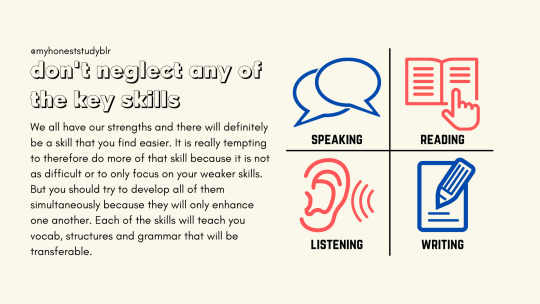
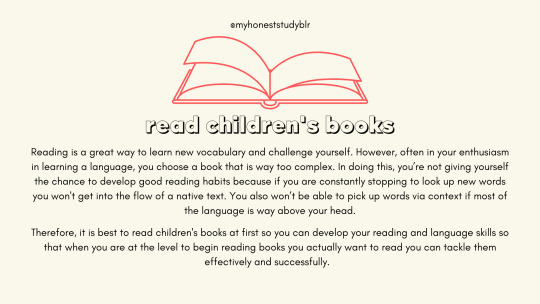


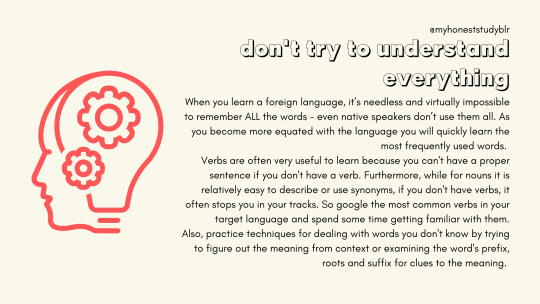
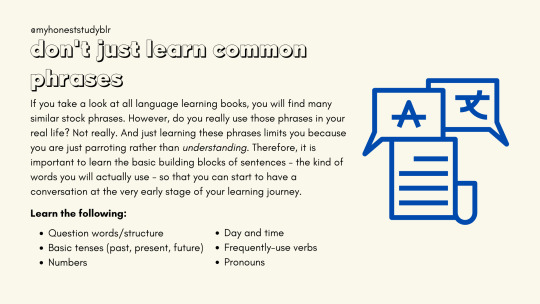
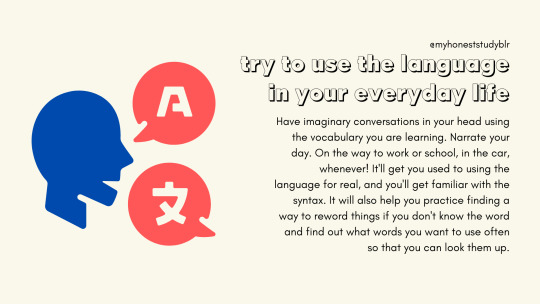


my masterpost | my studygram | ask me anything
[click images for high quality]
[transcript under the cut]
Other advice posts that may be of interest:
How To Study When You Really Don’t Want To
How To Do Uni Readings
Active Revision Tips
Okumaya devam et
8K notes
·
View notes
Text
~やすい (易い) Easy to, Likely to
Verb[ます]+ やすい
Polite: Verb[ます]+ やすい + です
*Do not confuse this with the word 安い, which has the same reading but means "cheap". Also, this grammar is usually used with hiragana alone.
An い-Adjective that is regularly seen attached to the ます stem of verbs (the form of a verb that can be used as a noun). When attached in this way, it carries the meaning of ‘easy to (A)’, where (A) is the verb that comes before やすい.
私は食べやすいサイズにステーキを切る。I will cut the steak into a size that's easy to eat.
この漫画にはフリガナがついているから読みやすいです。Since this manga has furigana included, it’s easy to read.
It can also mean "prone to" or "likely to" in a personality or emotional sense, such as this:
あの先輩は怒りやすいからめんどくさい。That senpai is prone to getting angry, so he's annoying.
カスミちゃんは 泣きやすいから優しくしてね。Kasumi is likely to cry, so please be nice to her. (Kasumi cries easily)
*Although 易やすい is an い-Adjective, it is almost never used when not attached to verbs (by itself). In such cases, it is much more natural to use the な-Adjective 簡単 (かんたん).
Examples of using it wrong:
昨日やすいゲームを買った。The game that I bought yesterday was cheap. (安い meaning cheap, not 易い meaning easy)
私は簡単なゲームが好きです。I enjoy easy games. (易い would not work here, as it is not usually used without a verb)
#Learn Japanese#Japanese numbers#Japanese#Easy Japanese#Beginner Japanese#Japanese langblr#Japanese language#nihongo#Japanese grammar#Japanese N4 grammar#N4 grammar#intermediate japanese#beginner japanese#review japanese#review japanese grammar#langblr#studyblr#japanese langblr#japanese studyblr#study japanese#learn japanese#bunpro#peistudies
27 notes
·
View notes